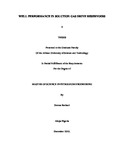Browsing by Title
Now showing items 4725-4744 of 4783
-
A weather related causal analysis on consolidated delay at Newark Liberty International Airport
(University of Cape TownFaculty of ScienceDepartment of Computer Science, 2013)The closure of the European airspace due to the eruption of the Icelandic volcano Eyjafjallajokull in 2010 proved a major challenge for airlines and aviation authorities on a global scale. In contrast, more seasonal adverse ...
-
A web browsing workload model for simulation
(University of Cape TownFaculty of ScienceDepartment of Computer Science, 2004)The simulation of packet switched networks depends on accurate web workload models as input for network models. We derived a workload model for traffic generated by an individual browsing the web. We derived the workload ...
-
Web-based management of time-series raster data
(University of Cape TownFaculty of ScienceDepartment of Computer Science, 2010)Data discovery and data handling often presents serious challenges to organizations that manage huge archives of raster datasets such as those generated by satellite remote sensing. Satellite remote sensing produces a ...
-
Well Performance in Solution Gas Drive Reservoirs
(2010-12-12)The practical application of various production parameters and relations to predict the well performance analysis of a solution gas drive reservoir is the primary objective of this study. These parameters include: IPR ...
-
Werner Reichardt: the man and his scientific legacy
(2011-03-04)Excerpts from a talk given by Tomaso Poggio in Tübingen on the opening ofthe Werner Reichardt Centrun für Integrative Neurowissenschaften, December 8, 2008.
-
Whanaungatanga: Sybil-proof routing with social networks
(2009-09-24)Decentralized systems, such as distributed hash tables, are subject to the Sybil attack, in which an adversary creates many false identities to increase its influence. This paper proposes a routing protocol for a distributed ...
-
What a Parallel Programming Language Has to Let You Say
(1984-09-01)We have implemented in simulation a prototype language for the Connection Machine called CL1. CL1 is an extrapolation of serial machine programming language technology: in CL1 one programs the individual processors ...
-
What Are Plans For?
(1989-10-01)What plans are like depends on how they're used. We contrast two views of plan use. On the plan-as-program-view, plan use is the execution of an effective procedure. On the plan-as-communication view, plan use is like ...
-
What Corners Look Like
(MIT Artificial Intelligence Laboratory, 1971-06)An algorithm is presented which provides a way of telling what a given trihedral corner will look like if viewed from a particular angle. The resulting picture is a junction of two or more lines each labelled according to ...
-
What is Decidable about Strings?
(2011-02-01)We prove several decidability and undecidability results for the satisfiability/validity problem of formulas over a language of finite-length strings and integers (interpreted as lengths of strings). The atomic formulas ...
-
What is Delaying the Manipulator Revolution?
(MIT Artificial Intelligence Laboratory, 1978-02)Despite two decades of work on mechanical manipulators and their associated controls, we do not see wide-spread application of these devices to many of the tasks to which they seem so obviously suited. Somehow, a variety ...
-
What Makes a Good Feature?
(1992-04-01)Using a Bayesian framework, we place bounds on just what features are worth computing if inferences about the world properties are to be made from image data. Previously others have proposed that useful features reflect ...
-
What the Assassin's Guild Taught Me About Distributed Computing
(2006-05-27)Distributed computing and live-action roleplaying share many of thesame fundamental problems, as live-action roleplaying games commonly include simulations carried out by their players.Games run by the MIT Assassin's Guild ...
-
What to Read: A Biased Guide to AI Literacy for the Beginner
(MIT Artificial Intelligence Laboratory, 1972-11)This note tries to provide a quick guide to AI literacy for the beginning AI hacker and for the experienced AI hacker or two whose scholarship isn't what it should be. most will recognize it as the same old list of classic ...
-
What's in a Tune
(1974-11-01)The work reported here began with two fundamental assumptions: 1) The perception of music is an active process; it involves the individual in selecting, sorting, and grouping the features of the phenomena before her. ...
-
What's What
(MIT Artificial Intelligence Laboratory, 1971-03)An outline of the modules used in the copy demonstration, the reasons for doing robotics, and some possible directions for further work.
-
-
Why are There so Few Female Computer Scientists?
(1991-08-01)This report examines why women pursue careers in computer science and related fields far less frequently than men do. In 1990, only 13% of PhDs in computer science went to women, and only 7.8% of computer science ...
-
Why Classical Finite difference Approximations fail for a singularly perturbed System of Convection-Diffusion Equations
(2016-06-07)We consider classical Finite Difference Scheme for a system of singularly perturbed convection-diffusion equations coupled in their reactive terms, we prove that the classical SFD scheme is not a robust technique for solving ...
-
Why Classical Finite difference Approximations fail for a singularly perturbed System of Convection-Diffusion Equations
(2016-06-07)We consider classical Finite Difference Scheme for a system of singularly perturbed convection-diffusion equations coupled in their reactive terms, we prove that the classical SFD scheme is not a robust technique for solving ...



